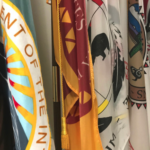November is National American Indian Heritage Month, also commonly called American Indian and Alaska Native Heritage Month. The first American Indian Day was celebrated by a few state governments shortly after the turn of the 20th century, but it wasn’t until 1990 that the federal government proclaimed the month of November as a time to recognize the many significant contributions Native Americans made to the establishment and growth of the US.
Prior to European contact, around 500 distinct indigenous languages were spoken in North America. You can see some of this diversity in the National Atlas of Indian Tribes, Cultures & Languages, free from the Library of Congress. According to the 2010 Census, only around 169 of these languages are still spoken by less than half a million people. Explore the languages and revitalization efforts around the world at the Endangered Languages Project.

Map showing approximate distribution of Native nations prior to European contact. From the Museum of the American Indian, Smithsonian Institution.
In North America, much linguistic and cultural diversity was lost through repressive US. governmental policies that forced American Indian children to attend boarding schools where they were punished for speaking languages other than English and for participating in their cultural traditions. The goal of these policies was assimilation and they also left a legacy of trauma and alienation within American Indian communities. Use this bibliography to start learning more about the policies of “Indian Removal” and their aftermath. Today, the National Museum of the American Indian is working to foster a more inclusive discourse around Native American history and culture in the classroom through their Native Knowledge 360° program.
Given this historical context, it is particularly significant that Joy Harjo, Muscogee (Creek) Nation, was named the 23rd Poet Laureate of the United States. A prominent activist for equality in Native American and women’s rights, her writings draw on her Creek heritage to explore themes of colonization, imperialism, and the unity of all things.
Find more from Joy Harjo and other American Indian writers in the Emory Library collection and explore this bibliography of Native American Oral Literature. Emory faculty, students, and staff can request books by signing into discoverE (2020-2021 library borrowing services).
Visit the Emory Libraries collection to learn about other forms of Native American Indian expression through food, community, and historic recipes, music, film, and drama.
- Browse the genre American Indian music in Alexander Street Press Music Online
- Browse Cultural Groups in Naxos World Music Library
- Watch the 2-minute music video, First Nations: Under a Grove, and find other documentaries at Academic Video Online
- Database of North American Indian Drama
Learn more about American Indian history and contemporary issues with these databases.
- Bibliography of Native North Americans, published literature about native peoples of North America
- American Indians and the West, a well-organized and visually interesting collection from the Newberry Library
- American Indian Newspapers, created in collaboration with tribes across the US
- Indian Country Today, news platform covering perspectives and issues from the indigenous world
For questions regarding American Indian resources at the Woodruff Library, please contact our anthropology librarian, Lori Jahnke, or another subject librarian focusing on your area of interest.
By Lori Jahnke, anthropology librarian and Kristan Majors Chilcoat, science librarian

